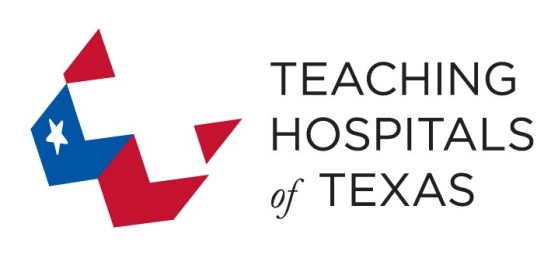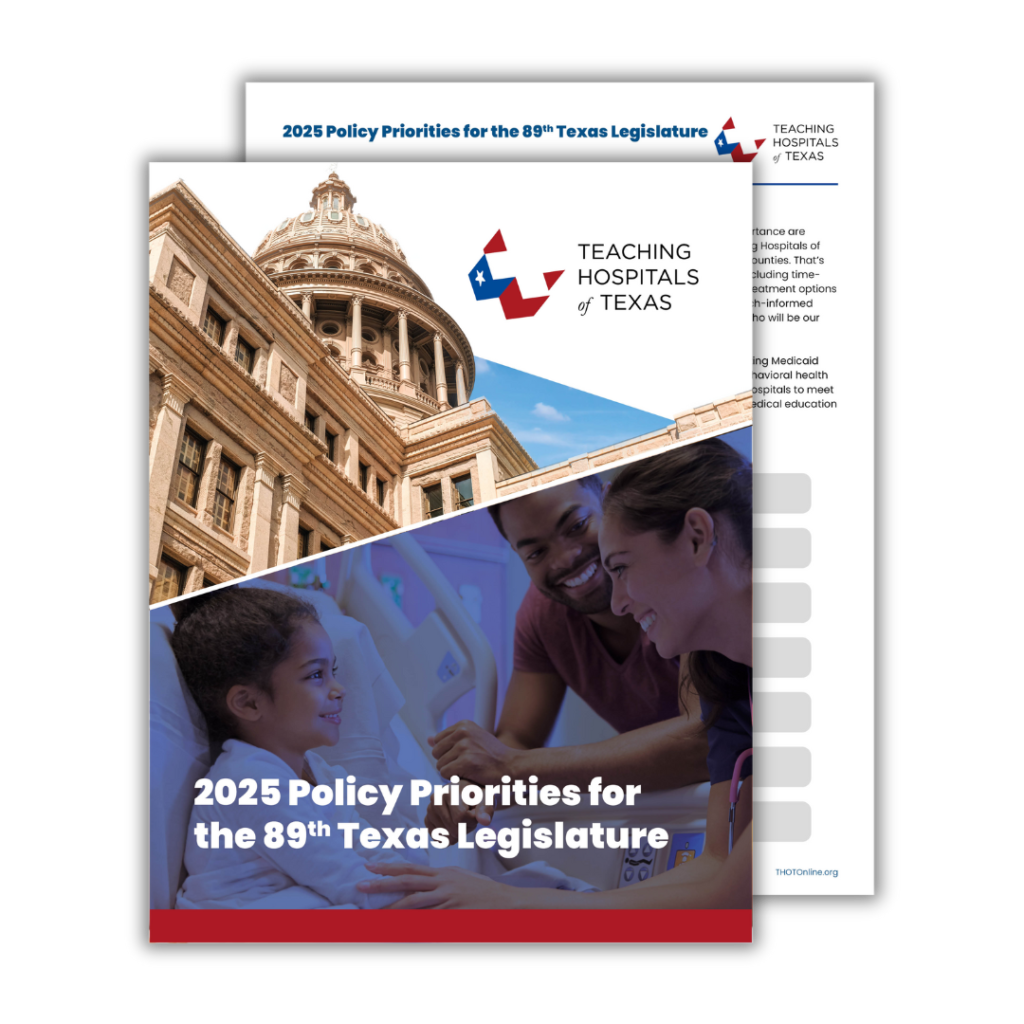Teaching Hospitals of Texas
2025 Policy Priorities
Texas’ teaching and public hospitals have an essential role in meeting the emergency, primary, and specialty care needs of their local communities while advancing Texas’ place as a national leader in medical education and research. As both safety net providers and world-class research and education institutions, THOT members touch the lives of Texans from all 254 counties.
To support their work, THOT is prioritizing the following during the 89th Texas Legislature:
Financing changes, inflationary pressures, and ongoing workforce disruptions and shortages continue to challenge health systems. Addressing these challenges while supporting the long-term sustainability of Texas’ teaching and public hospitals’ services, including patient care, workforce education and training, and trauma and disaster prevention and response, is our top priority for 2025.
THOT SUPPORTS:
- Maintaining trends in state general revenue funding for Medicaid to ensure the program’s stability and ability to provide timely and accessible care for the children, pregnant women, and vulnerable populations who rely on it for coverage.
- Investing Medicaid funding to support parity among different hospital types and ensure support for critical teaching and safety net system priorities and services.
- Continuing support for innovation and technologies that increase the quality of and access to care, including payment for the audio-only provision of non-behavioral health care services.
- Supporting 340B program-participating hospitals’ ability to provide increased access to care by ensuring pharmacy benefit managers, third-party payers, and drug manufacturers do not limit access to 340B program savings and the enhanced healthcare access made possible by the program.
- Preserving hospitals’ Medicaid outpatient payment amounts to increase access to timely and cost-effective care and avoid more resource-intensive emergency and inpatient settings.
- Investing in cost effective and clinically appropriate methods to deliver Medicaid dialysis services in an outpatient setting for certain eligible populations.
Local hospital districts and health systems are critical to Texas’ statewide trauma and disaster planning and response, healthcare workforce training, and patient care, especially for Texans with little or no access to care. Their continued work depends on their continued ability to financially support that critical healthcare infrastructure.
THOT SUPPORTS:
- Upholding the Special Taxing Unit exemption for hospital districts at the current eight percent rollback rate.
- Preserving hospital districts’ current bond and certificate of obligation authority.
- Ensuring hospital districts’ ability to educate and inform the Legislature about the challenges and needs of their communities.
Texas’ teaching and public hospitals share a mission and commitment to timely access to health care delivered at the right time in the right setting. They provide a significant amount of care in outpatient, community-based settings in the neighborhoods where their neediest patients live and work. Teaching hospitals are also “owned” by and accountable to their communities and are incentivized to maximize health in a cost-effective manner. No matter how Texas chooses to increase the number of Texans with health insurance coverage, teaching and public hospitals will partner to improve community-based, cost-effective health services and drive innovation.
THOT SUPPORTS:
- A comprehensive statewide coverage initiative
Hospital district-based managed care plans improve the quality and cost-effectiveness of care and create a path to independence through continuity of care by providing services for those who are uninsured; those with Medicaid coverage; and those with health insurance marketplace coverage. They are also vital partners with local physicians and an important part of community-informed approaches to care. Protecting Medicaid and other publicly insured enrollees’ ability to choose local, hospital-district plans improves quality, promotes competition, and advances healthcare value.
THOT SUPPORTS:
- Ensuring Texans with Medicaid or other public coverage have a choice of hospital district-based managed care plans.
The Texas trauma system provides critical infrastructure to respond to mass casualty events, significant weather events, and disease outbreaks as well as heart attacks, strokes, and other individual accidents and injuries, such as motor vehicle crashes. Level I-designated trauma centers provide the highest level of trauma care, have 24/7 responsiveness and are central to a coordinated, statewide trauma response. THOT members operate nearly half of the state’s 22 Level I trauma centers.
THOT SUPPORTS:
- Maintaining trauma funding at last biennium’s level, at a minimum, including the trauma, rural, and safety-net hospital add-ons.
The Governor’s Task Force on Health Care Workforce Shortages highlights the ongoing need to invest in clinical training sites, workforce retention strategies, and improved coordination between schools and clinical sites to increase training and retention of Texas’ healthcare workforce. Growing our clinical capacity, supporting the preceptors providing hands-on clinical education, investing in nurse residencies (transition to practice) to retain new nurses, and funding clinical innovation will help grow our workforce and capture the state’s education investments.
THOT SUPPORTS:
- Funding the grant programs created in SB 25, 88th Legislature, regular session, to support clinical nursing education and training including:
- clinical site nurse preceptor grants
- clinical sites innovation and coordination grants to increase the nurse workforce and improve retention.
- nurse faculty grant programs that invest in clinicians serving as part-time faculty and support faculty working part-time in clinical settings.
- Increasing state general revenue for the state’s Health-Related Institutions’ Formula Funding.
- Maintaining state general revenue for the state’s Graduate Medical Education (GME) Expansion Grants.
- Funding to address shortages of allied health professionals and other critical health care staff.
Continuing previous Legislatures’ investments in behavioral health services and facilities will support training additional behavioral health care professionals, reduce wait times for needed care, and increase access to evidence-based treatments and supports. Additional targeted investments will improve the cost-effectiveness of the state’s investments in care and better address barriers for some individuals, including children and adolescents.
THOT SUPPORTS:
- Continuing investments in the state’s mental health workforce.
- Medicaid coverage for intensive outpatient therapy and partial hospitalization.
- Seeking a waiver of the Medicaid Institution for Mental Disease (IMD) exclusion to allow for Medicaid funding of inpatient behavioral health care for adults.
- Ongoing initiatives and funding to increase the number of psychiatric beds, including additional community hospital beds and increased reimbursement amounts.
- Increasing funding to support state psychiatric hospitals’ operating costs.
- Continuing investments in the Texas Child Mental Health Care Consortium, including school-based and tele-enabled behavioral health care for children and adolescents such as CPAN and TCHATT.

